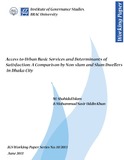Access to urban basic services and determinants of satisfaction: a comparison by non-slum and slum dwellers in Dhaka city
Abstract
Dhaka has experienced rapid urbanization in recent decades. However, the city’s infrastructure
and basic utility service provisions lag behind its physical expansion making it one of the least
livable cities in the world. The government of Bangladesh provides various utility services viz.,
water, electricity, waste collection, among others, to urban dwellers. However, the satisfaction
level of those utility services among the recipients varies widely. This paper has examined the
end-users’ satisfaction level- considering both slum and non-slum consumers- of three key utility
services namely, water and sanitation, waste management and electricity in Dhaka city. The
study has also identified the determinants of satisfaction level of those services. Based on survey
data, the current level of satisfaction is examined through Likert data analysis (median and
mode reported) and the determinants of the level of satisfaction are identified through regression
analysis. It is found that majority of the households’ satisfaction level for the aforementioned
services are lower irrespective of slum and non-slum consumers. It is also observed that people
living in non-slums are better-off vis-à-vis their counterparts living in slums. However, the
satisfaction level of the latter is relatively higher than the former. Determinants of satisfaction
for individual utility services are reported in the paper.

